- Home
- Sebastian Faulks
Human Traces Page 7
Human Traces Read online
Page 7
Father can be persuaded to pay, I suppose, in the name of Education; if not . . . Well, I am not the kind of wife to play the coquette, and anyway I do not think it would be profitable. But you must come. It is a fine town, I am told, and a very fit place for a young man to pass his twenty-first summer.
Respond at once, saying yes, to your ever-loving and -guiding
Sonia.
PS Please do say yes.
The atmosphere in the dining room in the Pension des Dunes was even stuffier than Sonia had feared, since most of the residents appeared to dread fresh air, frowning and clacking if the waiters left a sliver of door open. There were about forty guests in all, a few families whose small children were made to sit up straight with their hands visible on the table, but mostly grey-haired couples of long familiarity, who faced one another in committed silence.
Richard Prendergast ran his finger round the inside of his collar. ‘I wish they would open a window.’
‘We can have coffee outside,’ said Sonia. ‘There’s a charming little garden. Did you see it?’
‘Yes,’ said Thomas. ‘With lanterns and red creeper on the walls.’
The waiter placed a tureen of soup on the table and invited them to serve themselves. Sonia lifted the lid and a smell of cress and summer savory floated upward.
‘I see you have grown a beard, Thomas,’ said Richard. ‘Do all your fellow-students have beards beneath their scholar’s caps?’
‘Almost all. Do you like it?’
‘It makes you look older,’ said Sonia.
‘It’s a bother keeping it trim.’
‘You should visit my barber in Leadenhall Street,’ said Richard. ‘Now let’s hear some French from you, young man.’
‘After two days? You are a hard master. But I can speak to the waiter if you like. Shall I ask him for some wine?’
As Thomas looked about the room, he saw an unusual couple seated at a table by an enviably open window. One was a Curé, sweating a little beneath his soutane, the other a young man of about Thomas’s age with black brows, a moustache and staring brown eyes. Something about his expression made Thomas want to smile.
‘I wonder what brings them together,’ he said quietly to Sonia, gesturing with his head.
‘I suppose the young man is being prepared for the priesthood.’
‘In Deauville?’said Thomas. ‘Morelikely to be prepared for the Turf here, isn’t he? And somehow he doesn’t have a devout look about him. He reminds me of a fellow I know in Trinity.’
Their waiter was a tall, mournful man with a bald head and a thick moustache that gave him a look of the late Prince Albert. His manner was also regal, as he endowed the table with the burgundy; to each diner he offered a half glass of wine, then bowed slightly, and moved off on flat feet.
He returned a few minutes later with some plates of sole in a cream sauce and a china dish of petits pois.
‘Nothing wrong in drinking red wine with fish,’ said Richard, looking round for the bottle which Prince Albert had secreted. ‘Drink what you dash well like, that’s what I always say.’
‘The sole is good, isn’t it?’ said Sonia.
‘Yes,’ said Thomas. ‘Has my sister proved a satisfactory housekeeper, Richard?’
‘Adequate, thank you. We had to let the cook go at Christmas. Domestic economies, you see.’
‘I enjoy it,’ said Sonia. ‘It’s a pleasure for me to make a dinner for Richard’s friends, then to manage the budget with some modest suppers.’ She did not look up from her plate as she spoke.
In the garden after dinner, they found themselves seated at the table next to the Curé and his charge.
‘Here’s a chance,’ said Richard. ‘Ask the young fellow what he’s doing. Let’s see what your French is made of.’
‘Not much,’ said Thomas. ‘That’s why I have come. Let me have a cognac, I need some courage. Sonia speaks better than I do. Papa once sent her for a summer to a family – in Brittany, I believe.’
‘That’s enough excuses. Go on with you.’
Thomas shifted his chair against the paved courtyard and cleared his throat as he leaned across the neighbouring table. In an accent in which he himself could almost hear the roar of theWash, he said, ‘Good evening. My sister and her husband and I, we were asking ourselves what was bringing you to Deauville this summer and if the boarding house pleases you.’
‘Good evening, Monsieur,’ said the Curé. ‘My friend and I have come for a week’s holiday. I promised him that if he was successful in his examinations I should reward him with a week at the seaside. Although his family lives near the sea, he has never had a holiday in all his twenty years. As to the boarding house—’
‘Me also,’ said Thomas, ‘I mean, I too, have – am twenty years old. My name is Thomas Midwinter. I have come from England.’
‘I thought perhaps you did. We are from Brittany. May I introduce my friend Jacques Rebière, a great doctor of the future.’
Jacques held out his hand to Thomas. ‘What did he say, Father?’
‘He is the same age as you and he comes from England.’
Thomas introduced Richard and Sonia.
‘Do you speak English?’ Thomas asked Jacques.
Jacques shook his head, looking startled.
‘Jacques’s education was late in starting,’ Abbé Henri said, ‘but every week he is making up the ground that he lost. And you yourself, sir, I presume you are studying at one of those fine old English universities.’
‘Yes. It is very ancient and very fine. My sister thinks I do not work enough, but this is not true. Each morning I must do a lecture and a practical demonstration of the anatomy.’
‘You speak very good French.’
‘No, this too is not true. This is why I am come here in France. When I speak then about lecture and anatomy it is easy because the words are the same thing in English. Like this I have the air of a good French. But it is not true.’
Thomas noticed Jacques’s tense expression resolve at last into a brief grin; it was an extraordinary expression, like a piece of fruit gashed by a cutlass. His mouth had a hundred shining teeth; then it was closed, the moustache realigned itself and the brows re-knitted in perplexity. Thomas felt his own lips twitch in amusement.
It transpired that Abbé Henri spoke some English and was able to make himself pleasant to Richard, who looked displeased at having been excluded from the conversation. One of Sonia’s accomplishments, one of the makeweights in her father’s downward adjustment of her dowry, was a fluent if idiosyncratic French; her accent was free of any Gallic influence, but she was able to understand almost everything and to reply at speed. At the end of the evening, they parted company in the hotel vestibule, but Thomas did not feel ready for bed.
He turned to Jacques. ‘Would you want to walk for a few minutes?’
Jacques shrugged one shoulder. ‘Yes.’
‘To the beach?’
‘Yes.’
‘Good night, Sonia. Good luck at the tables, Richard.’
It was a warm evening as they went down the streets towards the front, between the quiet villas and their tree-shaded gardens. Each took off his jacket and carried it over his shoulder. Thomas smiled encouragingly at Jacques in the darkness but could see no response.
When they arrived at the front, Jacques said something that Thomas did not understand. After some repetitions, it was agreed that they should walk on the sand, and they made their way past a series of small wooden changing huts and some bathing machines that had been pulled back from the tide.
Thomas took his shoes off and tied them round his neck, then put his socks in his pocket so he could feel the cold sand under his feet.
‘It is good,’ he said, but Jacques merely shrugged and walked on. Thomas wondered what he would have to do to elicit another of those smiles.
‘What do you study?’ said Thomas.
‘I am studying medicine in Paris.’
‘Does your family inhabit Paris
?’
‘My family is from a small village near the coast. Sainte Agnès. No one has ever heard of it. It is very bare and bleak. Monsieur the Curé says even the rocks of the seashore cry out for God’s mercy.’
Jacques spoke rapidly, with no concession to his English listener; Thomas, struggling to follow, was not sure whether to be irritated or flattered. Perhaps Jacques was inhibited in some way by his presence, but there seemed little he could do about it, now that they were committed, close to the dark water’s edge with no one else in sight.
They stared towards the sea in uncompanionable silence. It was a clear night, and beyond the bay of Trouville to their right Thomas could make out the distant lights of Le Havre; above them, the sky was smeared with stars.
Thomas pointed. ‘How do you call this star?’
‘The polar star.’
‘We call it the North Star. Do you think there is an . . . Intelligence there?’
‘In the sky?’
‘In the Universe.’
Jacques said nothing and Thomas wondered if he had insulted him. He knew that, although France was proud of the fact that it was a lay republic, most French people were still fierce in their Catholic beliefs; he feared that he had offended Jacques by questioning the existence of his god, though in fact he had meant to suggest something vaguer.
‘I ask pardon if I . . .’ He could not find the words.
‘No, no.’ Jacques cut him off.
Thomas sat down on the sand. He would not give up yet, he thought; he would simply continue to talk without asking questions, and see if that way he could tempt Jacques to respond.
Laboriously, he set off. ‘My sister inhabits London. I like the theatre. I go often to the theatre. Do you like . . . I like Shakespeare. He is an English writer. Perhaps you do not know him at France. I am a student of medicine. I have one brother also, he is older and will take the work of my father and his house. I find interest in philosophy – same word in English – and the way in which functions the mind of the human.’
‘Stop! Stop! Wait there. I will be ten minutes. Don’t move from there!’ Jacques ran off, stumbling, back over the shallow waves of sand, then gained his footing more surely as he neared the road where, as Thomas watched in astonishment, he leapt the small brick wall beneath the streetlamp and ran back into the town.
Thomas lay flat on the sand and shook with laughter.
Ten minutes later, Jacques, panting, knelt down beside him. He carried a wicker basket, from which he took a bottle of wine, two glasses, a half empty bottle of cognac, a Camembert, a loaf of bread and a box of violet-scented chocolates. He drew the cork and poured some wine into a glass which he handed to Thomas. His white teeth flashed in the darkness.
‘Thank you,’ said Thomas. ‘Where have you found these things?’
‘In the boarding house. I know where they are kept. Do you want some cheese?’
‘Not now. And what—’
‘Wait.’ Jacques put his hand on Thomas’s arm. ‘I am always hungry, even after dinner. And the food at the pension, it’s—’
‘It’s marvellous.’
‘Yes, it is. But wait. I want to talk to you, but it’s difficult for me. My mother died when I was a baby and my elder brother is not well. I left school when I was young so I could go and work for my father, and Abbé Henri is the only real friend I have had. So when you began to talk—’
‘Excuse me,’ said Thomas. ‘May you talk more slowly, please. Thank you.’
‘Ah, it’s difficult.’ Jacques stood up. ‘I have so much to say and I sense that for the first time in my life I have found someone who can understand it. I only met you this evening, of course, but I know it . . . Here.’ He banged his sternum so hard with his closed fist that Thomas thought he must have hurt himself.
‘Slowly,’ said Thomas. ‘Slowly. At least you may help teach me French.’
‘I will. At once. The best way to learn is to listen.’
‘Is that true?’
‘Yes. Alas.’ They laughed at the same time.
Jacques began to describe his studies in physiology and anatomy, the lectures, the classes, the unforgiving timetable. ‘I sleep on the floor of another student. He is often out at night, so sometimes I climb into his bed. Abbé Henri has paid for my courses and I can’t ask him for more money, so sometimes I have to work in the laundry or at a bar. I don’t mind. My mind is so much on fire for what I’m learning, but I am frustrated because I want to move beyond the movement of the bowel or the function of the liver and—’
‘Gently.’
‘Forgive me. When you spoke just now – what were the words you used? About the mind. It doesn’t matter. I can come back to that. You see, I have this idea that we must somehow try to understand the meeting point between thought and flesh. That is what the next great aim and discovery of medical science will be. Are you with me?’
‘I think so. I—’
‘We have alienists in the asylums. We call them asylums butthey areprisons, really. We have neurologists, great neurologists in this country, and in Germany, and of course we have physicians. Even in your country – forgive me—’
‘It’s all right, I—’
‘Physicians by the score! But a medicine that would understand and cure those whose sickness is in the mind and which could determine its causes . . . That is something I dream about.’
Thomas looked over his wineglass as Jacques’s torrent slowed for a moment. He had understood most of it, he thought.
‘I think the proposition,’ Thomas said, ‘it’s this. Forgive my French. To understand . . . To accomplish what you describe is a thing not only of medicine. I need, you need, also to see at what point the human being rests on his journey of evolution. You know the book of Mr Darwin which comes out twenty years past?’
‘In the year of my birth?’
‘Exactly. Our birth, in effect. And for me there is also a question of psychology, such as the great writers speak of, which is important here also. I mean to say, it is more than a question of dissection of dead people to see the cause of a malady. And at last . . .’
Thomas found himself struggling, but thought it was important to continue, because this aspect of what he had to say was to him the most important. ‘There is at last the question of what we might call . . . how does one say . . . the sensation of being alive and of thinking . . .’
‘Awareness?’ said Jacques.
‘Yes. To know if that is a faculty which also evolves. For some scientists, this power of – what are we calling it – awareness is that which separates humans from animals. It was God who provided it. But if this is a faculty of the mind which evolves as the human reason has evolved, or our ability to make things, then we are only animals after all. Forgive me. I explain myself badly. Or perhaps awareness is a thing which is there but which we do not yet completely see or use, as for many millions of years human beings did not have fire, or electricity. Then, once it is discovered, everyone has it.’
Jacques grabbed his arm. ‘Exactly. Exactly. These are the questions I have been asking myself for a long time. I feel that there is an answer, perhaps a single answer, which may help us. But it is the project of a lifetime.’
‘I have a lifetime,’ said Thomas.
‘And you have a project.’
As Jacques began to talk again, Thomas began to see how aspects of his own interests and ambitions – things he had previously thought to be irreconcilable – might be brought together. Perhaps he and this extraordinary young man might really one day work together. And then, what might they not achieve? The discovery of new diseases that could be named after them – Midwinter’s Disease, Rebière Syndrome; a great teaching hospital that would carry on their methods after their death; but, more than such conventional stuff: a map of the mind and its million pathways . . . As Jacques’s ideas raged on in front of the gently breaking Channel waves, almost anything seemed possible. Thomas was thrilled not just by the exuberance of Jacques’s talk
, but by the certainty of the references. Although the Curé had said something about his education starting late, he clearly had a scientist’s turn of mind; though there was also, in his gesticulating hands, a suggestion of the crusader.
If Jacques had begun with chemistry and moved through the elements of medicine to an interest in neurology and behaviour, it might be, Thomas felt, almost a mirror of his own journey, which had begun in the abstract land of words and verses, taking half a handhold in psychology before he had acquainted himself with the rudiments of anatomy. If there was a common ground where they now met, it was unlikely that they would cross and diverge – that Jacques would ever end up reading Shakespeare or that he himself would master the details of chemical change. To this extent, their interests, while similar, also seemed to complement one another.
It was beginning to grow light, the colour of darkness slowly receding from the sky over Le Havre, leaving the pallid grey of cliffs and clouds to re-emerge from the mist. They still had a little cognac left, the last of which Thomas poured into the two glasses. They had been talking for more than six hours, yet he felt he had only begun to explore what needed to be said; he could not catch the next thought fast enough for his determination to do justice to the previous one.
As the night began to fade, Jacques drained his glass. ‘Shall I tell you something peculiar that has happened in the course of this conversation?’ he said.
‘What?’
‘You have become fluent in French.’
‘Have I?’
‘Yes. At the start you had all the words in the wrong order and you spoke slowly. Now you talk like a native. A native of Brittany, I am afraid, like me, with aVannes accent, but at least you sound like a Frenchman.’
Thomas felt gratified. ‘Now I shall have to teach you English.’
‘Dear God. Let us do the simple things first.’
‘Establish a new clinical method.’
‘Yes. And a map of the mind.’
‘Then English.’
Thomas bent down and put on his socks and shoes. ‘We can continue our conversation,’ he said, ‘over breakfast. One of the cafés on the front should be open by now.’

 Devil May Care
Devil May Care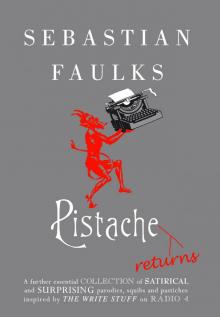 Pistache Returns
Pistache Returns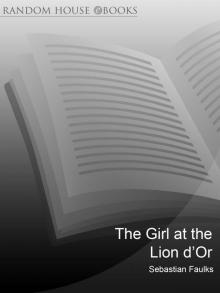 The Girl at the Lion D'Or
The Girl at the Lion D'Or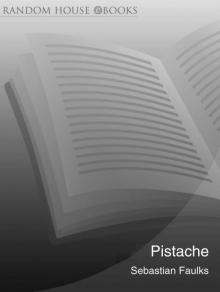 Pistache
Pistache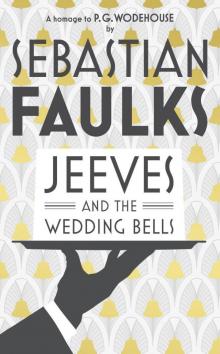 Jeeves and the Wedding Bells
Jeeves and the Wedding Bells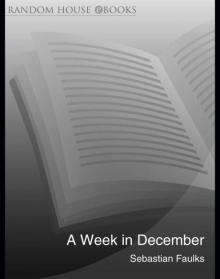 A Week in December
A Week in December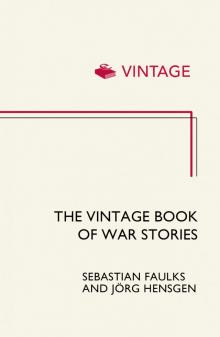 The Vintage Book of War Stories
The Vintage Book of War Stories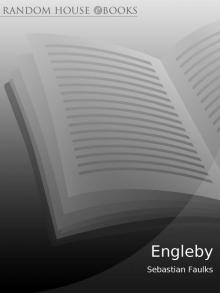 Engleby
Engleby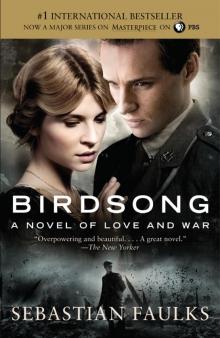 Birdsong
Birdsong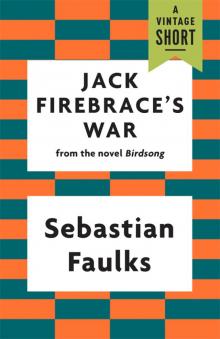 Jack Firebrace's War
Jack Firebrace's War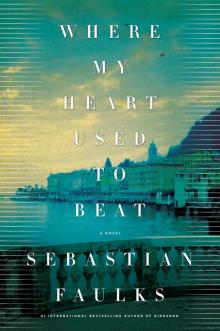 Where My Heart Used to Beat
Where My Heart Used to Beat A Possible Life
A Possible Life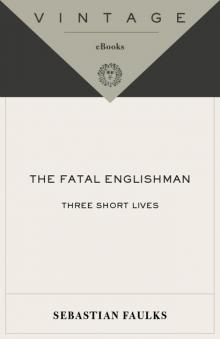 The Fatal Englishman: Three Short Lives
The Fatal Englishman: Three Short Lives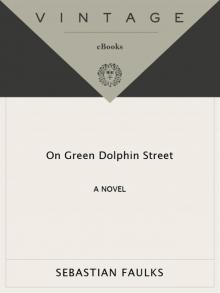 On Green Dolphin Street
On Green Dolphin Street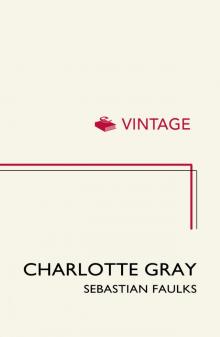 Charlotte Gray
Charlotte Gray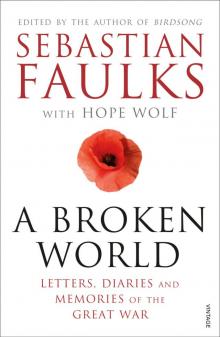 A Broken World: Letters, Diaries and Memories of the Great War
A Broken World: Letters, Diaries and Memories of the Great War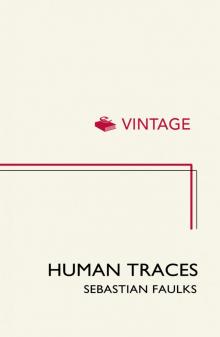 Human Traces
Human Traces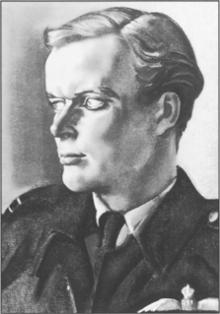 The Fatal Englishman
The Fatal Englishman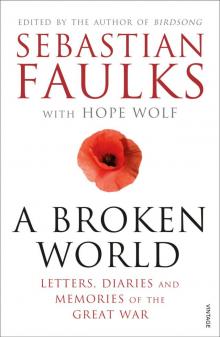 A Broken World
A Broken World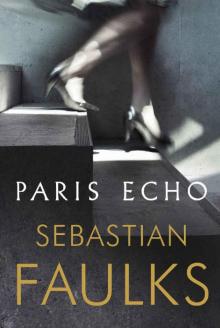 Paris Echo
Paris Echo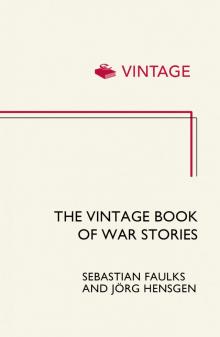 War Stories
War Stories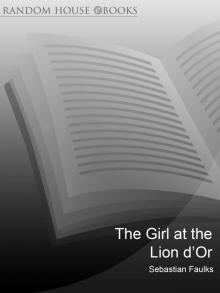 Girl At the Lion d'Or
Girl At the Lion d'Or